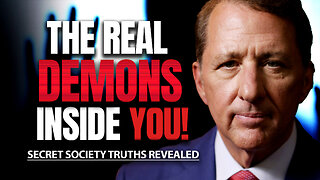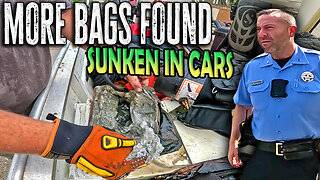Premium Only Content

Episode 2707: The Rise of Pagan Practices: A Crisis of Synodality and Relativism in the Church
Historical and Theological Context
The Mayan Rite, like the Zaire Use, represents a shift away from the traditional Christocentric focus of the Mass. This trend can be traced to Sacrosanctum Concilium, a Vatican II document often interpreted as opening the door to liturgical innovations. Traditional Catholic theologians, such as St. Thomas Aquinas, emphasized that worship must be ordered toward God, free from pagan influence, as a safeguard of the faith. Pope Pius X, in his encyclical Pascendi Dominici Gregis, warned against modernist tendencies that seek to adapt the Church to contemporary culture, often at the expense of doctrinal integrity.
St. Paul’s admonition in 1 Corinthians 10:20 “The things which the Gentiles sacrifice, they sacrifice to devils, and not to God” underscores the spiritual danger of incorporating pre-Christian rites. The Church must remain vigilant against any practices that could dilute or distort the true worship of God.
The Current Crisis
The Mayan Rite introduces ritual dances, female incensors, and lay-led prayers elements foreign to the Roman Rite. This could signal a broader movement towards syncretism, where pagan and Christian practices are blended, risking the Church's unique identity as the Body of Christ. Pope Leo XIII, in Humanum Genus, cautioned against allowing external influences to corrupt the Church’s mission.
The Synod on Synodality further compounds this crisis by emphasizing inclusivity and dialogue over doctrinal purity. This “theology of group hugs,” as critics call it, prioritizes human approval over divine truth, potentially leading the faithful into error.
The Crisis of Synodality and Relativism in the Modern Church
In recent years, the Catholic Church has witnessed a profound shift in its theological and pastoral approach, notably through the framework of synodality. This model emphasizes consultation, dialogue, and discernment among clergy and laity alike. While it is intended to foster unity and engagement, it has, in practice, opened the door to significant challenges. Chief among these are relativism and the infiltration of pagan practices, which pose a grave threat to the Church’s doctrinal integrity and spiritual mission.
1. The Emergence of Relativism
Relativism the belief that truth is subjective and varies according to individual or cultural perspectives has gained a foothold in modern Catholic thought. This mindset starkly contrasts with the Church's long-standing tradition of upholding absolute truths rooted in Divine Revelation.
Relativism dilutes core doctrines under the guise of pastoral sensitivity. For instance, traditional teachings on marriage, the sanctity of life, and the nature of sin are frequently reinterpreted to align with contemporary societal norms. The danger here is twofold: not only does this undermine the Church's authority to teach universal truths, but it also leads to confusion among the faithful, who struggle to discern right from wrong in a world where moral ambiguity reigns.
2. The Synodal Process: A Breeding Ground for Compromise
Synodality, as implemented today, often prioritizes consensus over fidelity to Christ’s teachings. Recent synodal gatherings have seen debates on issues such as blessing same-sex unions, the ordination of women, and the inclusion of non-Christian rituals in Catholic worship. While these discussions are framed as efforts to "meet people where they are," they risk compromising the Church's mission to call souls to conversion and holiness.
Rather than providing clarity and strengthening the faithful, the synodal process sometimes amplifies divisions. It creates the impression that Church doctrine is malleable, subject to the will of the majority. This is antithetical to the Church's identity as the custodian of eternal truths, entrusted by Christ to the Apostles and their successors.
3. The Resurgence of Pagan Practices
A particularly troubling aspect of the current crisis is the incorporation of pagan elements into Catholic worship and practice. This was notably seen during the Amazon Synod, where the veneration of the Pachamama a figure rooted in indigenous paganism sparked widespread controversy. Such practices blur the line between authentic inculturation, which seeks to integrate elements of a culture into the faith, and syncretism, which compromises the purity of Catholic worship.
The veneration of idols within sacred spaces is not merely a liturgical aberration; it signifies a deeper spiritual crisis. It reflects a departure from the first commandment, which calls for exclusive worship of the one true God. Moreover, it endangers the spiritual well-being of the faithful by exposing them to influences that are antithetical to Christian spirituality.
4. The Silence and Complicity of Church Leaders
Perhaps the most disheartening aspect of this crisis is the failure of many Church leaders to address these issues with courage and clarity. In an era where clear guidance is desperately needed, the faithful often encounter ambiguity or even outright endorsement of heterodox practices. This silence is not merely a pastoral failure; it is a dereliction of duty. Bishops and priests are called to be shepherds, guarding their flock from error and leading them to the truth. Their reluctance to confront the crisis head-on only exacerbates the problem.
5. The Path Forward: A Return to Tradition and Truth
The solution to this crisis lies in a wholehearted return to the Church's rich tradition and unwavering commitment to the truth. This involves:
Upholding Doctrinal Integrity: Church leaders must reaffirm and teach the unchanging truths of the faith with clarity and conviction, resisting the temptation to conform to worldly pressures.
Promoting Authentic Worship: The liturgy should be a reflection of the divine, free from innovations that dilute its sacred character. The reverent celebration of the Traditional Latin Mass offers a powerful antidote to the liturgical experimentation of recent decades.
Fostering Holiness Among the Faithful: By encouraging practices such as fasting, frequent confession, and Eucharistic adoration, the Church can help the faithful grow in virtue and resist the influences of relativism and paganism.
Defending Against Pagan Practices: Clear catechesis is needed to help Catholics understand the dangers of syncretism and the importance of preserving the purity of their faith.
Conclusion: A Call to Vigilance and Fidelity
The Church is at a crossroads. The rise of relativism, the misuse of synodality, and the resurgence of pagan practices threaten to undermine her divine mission. Yet, this crisis also presents an opportunity for renewal. By steadfastly adhering to the truths of the faith and drawing strength from the rich spiritual heritage of the Church, the faithful can navigate these turbulent times with confidence and hope.
Let us heed the words of St. Paul: “Watch ye, stand fast in the faith, quit you like men, be strong.” (1 Corinthians 16:13). In this spirit, we pray for the grace to remain faithful to Christ and His Church, trusting that the gates of hell will not prevail against her.
The Crisis of Synodality: A Traditional Catholic Analysis
The recent synodal developments under Pope Francis have sparked deep concern among traditional Catholics. The concern centers on the perception that the Church hierarchy is moving away from Christocentric teachings and embracing principles that resemble a secular or even pagan framework. This shift poses a danger of transforming the Church into an institution more concerned with societal trends than with preserving the Deposit of Faith. Below, I will analyze this crisis from a traditional Catholic perspective, referencing key theologians and papal teachings.
________________________________________
1. Synodality as a Political, Not Spiritual, Process
The Nature of Synodality
Pope Francis has frequently claimed that synodality is a spiritual process guided by the Holy Spirit. However, the synodal process has been marked by voting and majority decisions, which resemble parliamentary democracy rather than the divinely guided governance of the Church.
• St. Thomas Aquinas emphasizes that truth and doctrine are immutable, as they originate from Divine Revelation. The process of voting on doctrinal matters contradicts the principle that truth is not subject to human consensus (Summa Theologica, I-II, Q. 91, Art. 1).
• Pope Pius X, in Pascendi Dominici Gregis, condemned modernism's tendency to democratize Church governance, warning that such practices lead to doctrinal relativism.
The Historical Parallel of Arianism
During the Arian crisis, a majority of bishops held heretical views, yet the faithful led by figures such as St. Athanasius preserved orthodoxy. This historical precedent demonstrates that doctrinal integrity is not determined by majority opinion but by fidelity to Revelation.
________________________________________
2. The Abuse of Papal Authority
Papal Magisterium and Its Limits
By declaring the outcomes of the synod as part of the papal magisterium, Pope Francis appears to have overstepped his authority. The Pope's role is to safeguard and transmit the faith, not to innovate or delegate authority in a manner inconsistent with Christ's institution of the papacy.
• Pope Leo XIII, in Satis Cognitum, taught that the Pope cannot alter the substance of the faith. His role is to confirm the brethren in the faith (Luke 22:32), not to establish new doctrines or practices.
• St. Robert Bellarmine argued that a Pope who persists in manifest heresy separates himself from the Church, as he fails to fulfill his role as the visible head of the faithful.
________________________________________
3. Theological Implications of Synodal Statements
The Horizontalization of the Church
The synod's final document presents an ecclesiology that emphasizes communal and horizontal aspects over the Church's supernatural mission as the "universal sacrament of salvation" (Lumen Gentium, 48). This approach risks reducing the Church to a social organization rather than the mystical Body of Christ.
• Pope Gregory XVI, in Mirari Vos, condemned efforts to naturalize the Church's mission, warning that such efforts undermine its divine origin and purpose.
• St. Augustine emphasized that the Church's mission is to lead souls to eternal salvation through the grace of Christ, not to conform to temporal societal norms.
________________________________________
4. The Issue of Women's Ordination
Apostolic Tradition
The claim that the ordination of women to the diaconate is an "open question" contradicts the consistent teaching of the Church. The Apostolic tradition, as evidenced in both Scripture and practice, restricts holy orders to men.
• Pope John Paul II, in Ordinatio Sacerdotalis, declared definitively that the Church has no authority to confer priestly ordination on women, a teaching rooted in the example of Christ and the Apostles.
• St. John Chrysostom stated unequivocally that the priesthood is reserved for men, as it reflects Christ's own choice and the order established by God.
________________________________________
5. The Synodal Crisis: A Betrayal of Christ
The New Magisterium of Relativism
The synod's emphasis on "discernment" without clear doctrinal boundaries risks promoting relativism. By sidelining traditional teachings on sin, grace, and redemption, the synod undermines the centrality of Christ's sacrifice and the objective moral order.
• Pope Benedict XVI warned in Caritas in Veritate that detaching truth from love leads to destructive relativism, which undermines the Church's mission.
• St. Pius X referred to modernist reinterpretations of doctrine as the "synthesis of all heresies," noting their tendency to obscure Christ's unique role as the Redeemer.
________________________________________
Conclusion: The Path to Renewal
The current synodal developments pose a grave challenge to the integrity of the Catholic faith. The Church must remain steadfast in its Christocentric mission, rejecting pressures to conform to secular ideologies. As traditional theologians and popes have consistently taught, fidelity to the Deposit of Faith is the only path to authentic renewal.
Prayer for the Church: Lord Jesus Christ, guide Your Church with the light of Your truth. Preserve us from error and lead us always in the path of salvation. May Your Blessed Mother intercede for us, that we may remain faithful to You in all things. Amen.
Our Lady, Help of Christians, pray for us.
St. Michael the Archangel, defend us in battle.
In the Name of the Father, and of the Son, and of the Holy Ghost. Amen.
-
 28:37
28:37
marcushouse
1 day ago $10.17 earnedSpaceX Just Dropped the Biggest Starship Lander Update in Years! 🤯
36K15 -
 14:54
14:54
The Kevin Trudeau Show Limitless
3 days agoThe Hidden Force Running Your Life
118K27 -
 2:16:35
2:16:35
DLDAfterDark
12 hours ago $13.81 earnedIs The "SnapPocalypse" A Real Concern? Are You Prepared For SHTF? What Are Some Considerations?
34.1K15 -
 19:58
19:58
TampaAerialMedia
23 hours ago $10.52 earnedKEY LARGO - Florida Keys Part 1 - Snorkeling, Restaurants,
48.2K23 -
 1:23
1:23
Memology 101
2 days ago $10.22 earnedFar-left ghoul wants conservatives DEAD, warns Dems to get on board or THEY ARE NEXT
38K76 -
 3:27:27
3:27:27
SavageJayGatsby
13 hours ago🔥🌶️ Spicy Saturday – BITE Edition! 🌶️🔥
62.4K7 -
 26:09
26:09
Exploring With Nug
23 hours ago $12.98 earned13 Cold Cases in New Orleans What We Discovered Beneath the Surface!
57.6K28 -
 27:39
27:39
MYLUNCHBREAK CHANNEL PAGE
18 hours agoDestroying Time.
139K44 -
 3:27:19
3:27:19
Mally_Mouse
14 hours ago🌶️ 🥵Spicy BITE Saturday!! 🥵🌶️- Let's Play: Minecraft Christmas Adventure!!
136K13 -
 2:14:31
2:14:31
Side Scrollers Podcast
18 hours agoSide Scrollers INVITE ONLY - Live From Dreamhack
161K16